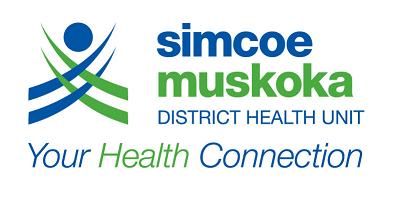During a serious health event, like when a highly contagious virus is circulating in the community and in Ontario, the Simcoe Muskoka District Health Unit (SMDHU), and other public health units and agencies provide information and actions that the public can use to stay safe. We do this by updating the public via local media, on the health unit’s website and social media accounts and when we share information, it is based on the best available science.
On March 19, the health unit shared that a lab-confirmed case of measles occurred in our community. This case resulted in a total of three cases connected to that household. On April 2, another lab-confirmed case of measles in an unvaccinated resident of Simcoe Muskoka who recently traveled internationally was reported. The case is unrelated to the case reported on March 19.
When information about measles in our community was shared on social media, a concerning number of comments and messages containing incorrect information that could endanger people’s health were posted in response. It is normal and expected that people will ask questions and reach out to one another through social media. However, some of the comments about measles on social media are particularly concerning because they are based on statements that are inaccurate and are contrary to well established scientific evidence. Here are some of the common false claims and the evidence-based facts that disprove them.
False claims: “No one dies from measles,” and “measles is as minor as a cold.”
Fact: Measles is one of the world’s most contagious viruses. It most commonly spreads through the air when an infected person coughs or sneezes. Anyone who is unvaccinated can get measles by being in a room where a person with measles has been and the virus can stay in the air for up to two hours after that person has left the room. If one person has it, up to 9 out of 10 people nearby will become infected if they are not protected. Just like other viruses, you can pick it up from touching contaminated surfaces and then touching your nose or mouth.
Symptoms of measles begin seven to 21 days after exposure and can include fever, runny nose, cough, drowsiness, irritability and red eyes. Small white spots appear on the inside of the mouth and throat but are not always present. Three to seven days after symptoms begin, a red, blotchy rash appears on the face and then progresses down the body.
There is no specific antiviral treatment for measles and many people will recover without special treatment or hospitalization. However, some people may suffer from severe complications, such as pneumonia (infection of the lungs) and encephalitis (swelling of the brain). They may need to be hospitalized and could die.
Hospitalization. About 1 in 5 unvaccinated people who get measles is hospitalized.
Pneumonia. As many as 1 out of every 20 children with measles gets pneumonia, the most common cause of death from measles in young children.
Encephalitis. About 1 child out of every 1,000 who get measles will develop encephalitis (swelling of the brain). This can lead to convulsions and leave the child deaf or with intellectual disability.
Death. Nearly 1 to 3 of every 1,000 children who become infected with measles will die from respiratory and neurologic complications.
Complications during pregnancy. If you are pregnant and have not had the MMR vaccine, measles may cause preterm birth or having a low-birth-weight baby.
Worldwide, as recent as the year 2000, there were about 800,000 deaths yearly. Thanks to the measles vaccine, that number has decreased significant, but sadly, there are still about 100,000 deaths yearly, mainly in unvaccinated children under the age of five years of age who live in lower income countries where access to the vaccine is difficult.
False claim: “We have measles cases every year.”
Fact: Measles was declared eliminated in Canada in 1998, meaning it was not commonly circulating in our country and this was achieved with high rates of people being immunized against measles. However, because we have been fortunate not to have seen family and friends suffering from measles infection in recent years, falsehoods about vaccines, and the disruptions caused by the pandemic, this has led to declining immunization rates and the resurgence of measles.
When the SMDHU reported a confirmed case of measles on March 19, 2025, it was the first case in Simcoe Muskoka since 2014. In 2025, a total of 655 measles cases (560 confirmed, 95 probable), with most of the cases related to an outbreak in largely unimmunized communities in southwestern Ontario. The number of cases across Ontario continues to grow, with 89 new cases reported by Public Health Ontario from March 27 to April 2. By comparison, a total of 44 measles cases in Ontario during the years from 2016 to 2023.
As measles continues to circulate in communities and countries with low vaccination rates, people can be exposed when travelling. This is of particular concern after the recent school break as people tend to travel more during this time and may be exposed and at risk of infection if their measles immunizations are not up to date.
False claim: “Most people who get measles are those who are vaccinated.”
Fact: Measles can infect both adults and children. In Ontario, 92.6 percent of affected infants, children and adolescents, and 64.3 percent of affected adults were unimmunized when they got sick.
Considering there is no existing treatment, the best way to protect our population is through immunization. The measles vaccine has been available in Canada since 1963 and is highly effective at preventing illness. One dose of measles, mumps and rubella (MMR) or measles, mumps, rubella and varicella (MMRV) vaccine provides 85 to 95 percent of protection, and two doses provide nearly 100 percent protection against measles.
False claims: “The vaccination includes live measles, so they are infecting you and making you sick with the disease,” and “the measles vaccination causes autism.”
Fact: Similar to other routine publicly funded vaccines, the MMR and MMRV are live attenuated (weakened) vaccines that have a minute amount of the measles virus. This means that after injection, the viruses cause a harmless infection in the vaccinated person with very few, if any, symptoms before they are eliminated from the body. This then allows the body to form a long-lasting immune memory that can prevent a future measles infection. Both vaccines are safe and approved by Health Canada.
As with any vaccine or other medical treatment, side effects may occur. The most common side effects from MMR(V) vaccination are a sore arm, joint stiffness and pain, a mild rash around the injection site and fever. These symptoms usually resolve on their own within a couple of days
There is no scientific evidence to support the claim that the MMR vaccine causes autism. Because signs of autism may appear around the same age that children receive the MMR vaccine, some people believe the vaccine causes the condition.
Much of the controversy over the MMR vaccine and autism came from a single paper published in 1998 that suggested a link. The report has been found to be fraudulent and was withdrawn by the journal that published it. Many large scientific studies around the world have found no link between the MMR vaccine and autism.
There is no evidence to link any other vaccines to autism. The number of children with autism seems to have increased in recent years. This is because the diagnosis of autism now includes children with milder symptoms who would not have been included in the past. There is also greater public awareness of autism, and more parents are seeking help. The exact cause of autism is unfortunately currently not known. While both genetics and environment likely play a role, ongoing scientific research into its exact cause continues.
Separating fact from fiction can be difficult when it is so easy to find huge amounts of information and opinions with a simple search and click. The health unit is one voice of many and like you our we are working to protect people’s health. Understanding knowing where the information you are getting is coming from and knowing if it is based on scientific evidence or opinion is vital and could even save your life. Reliable sources of information include Health811, SickKids’ About Kids Health website, the Canadian Paediatric Society’s Caring For Kids website and speaking with your health care provider about your concerns.
More information about measles and immunization is available at smdhu.org/Measles.
Dr. Colin Lee is an Associate Medical Officer of Health at the Simcoe Muskoka District Health Unit. His primary responsibilities are in the areas of vaccine preventable diseases, infectious disease and sexual health.








